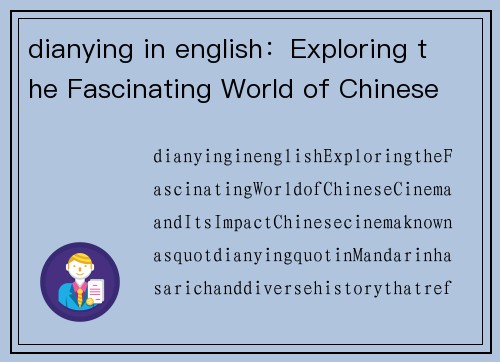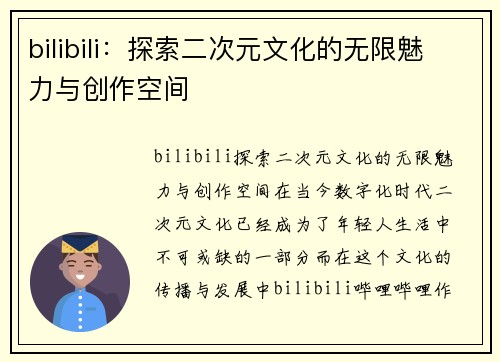dianying in english:Exploring the Fascinating World of Chinese Cinema and Its Impact
dianying in english: Exploring the Fascinating World of Chinese Cinema and Its Impact
Chinese cinema, known as "dianying" in Mandarin, has a rich and diverse history that reflects the cultural, social, and political changes in China over the decades. From its humble beginnings in the early 20th century to its current status as a global powerhouse, Chinese cinema has captivated audiences both domestically and internationally. This article delves into the fascinating world of Chinese cinema, exploring its evolution, key genres, notable filmmakers, and its significant impact on global cinema.
The Origins of Chinese Cinema
The roots of Chinese cinema can be traced back to the late 19th century when the first motion pictures were introduced to China. The first Chinese film, "Dingjun Mountain," was produced in 1905 and was based on a popular Peking opera. This early film marked the beginning of a new art form that would evolve dramatically over the years. The 1920s and 1930s saw the emergence of silent films, with filmmakers experimenting with storytelling techniques and cinematic styles. The Shanghai film industry became a hub for creativity, producing films that resonated with the cultural zeitgeist of the time.
黄色仓库hsc6永久发布页
The Golden Age of Chinese Cinema
The 1940s and 1950s are often referred to as the Golden Age of Chinese cinema. During this period, filmmakers began to explore more complex narratives and character development. The influence of Western cinema became apparent, as directors incorporated elements of Hollywood storytelling into their films. Notable films from this era include "Spring in a Small Town" (1948) and "The Love Eterne" (1963), which showcased the artistic capabilities of Chinese filmmakers. This period also saw the rise of the "leftist" film movement, which aimed to promote social change and reflect the struggles of the common people.
The Cultural Revolution and Its Aftermath
The Cultural Revolution (1966-1976) had a profound impact on Chinese cinema. Many filmmakers were persecuted, and film production came to a halt. The government imposed strict censorship, and films were required to align with the Communist Party's ideology. However, after the Cultural Revolution, the late 1970s and 1980s marked a resurgence in Chinese cinema. Filmmakers began to explore themes of individualism, personal freedom, and the complexities of modern life. This era gave rise to the "Fifth Generation" filmmakers, such as Zhang Yimou and Chen Kaige, who gained international acclaim for their visually stunning and thematically rich films.
Key Genres in Chinese Cinema
Chinese cinema encompasses a wide range of genres, each with its unique characteristics and appeal. Martial arts films, known as "wuxia," have gained immense popularity both in China and abroad. These films often feature heroic characters, intricate fight choreography, and themes of honor and loyalty. The "romantic drama" genre has also flourished, with films like "In the Mood for Love" (2000) exploring themes of love, longing, and societal constraints. Additionally, historical epics, such as "Hero" (2002) and "The Last Emperor" (1987), have garnered critical acclaim for their grand storytelling and visual splendor.
The Rise of Chinese Blockbusters
In recent years, Chinese cinema has witnessed the rise of blockbuster films that have achieved significant commercial success. Movies like "Wolf Warrior 2" (2017) and "The Wandering Earth" (2019) have broken box office records, showcasing the growing appetite for high-budget productions in China. These films often incorporate elements of science fiction, action, and patriotism, appealing to a broad audience. The success of these blockbusters has also led to increased investment in the Chinese film industry, attracting international collaborations and co-productions.
The Global Impact of Chinese Cinema
Chinese cinema's influence extends beyond its borders, shaping global cinematic trends and inspiring filmmakers worldwide. The international success of films like "Crouching Tiger, Hidden Dragon" (2000) and "The Farewell" (2019) has opened doors for Chinese stories to be told on the global stage. Furthermore, the collaboration between Hollywood and Chinese filmmakers has resulted in a fusion of storytelling techniques and cultural perspectives. This cross-cultural exchange has enriched the cinematic landscape, allowing for a more diverse representation of stories and characters.
Challenges Facing Chinese Cinema
Despite its successes, Chinese cinema faces several challenges. Censorship remains a significant issue, with filmmakers often navigating a complex landscape of government regulations. The pressure to produce commercially viable films can sometimes stifle creativity and innovation. Additionally, the rise of streaming platforms has transformed the way audiences consume films, leading to increased competition for traditional cinema. Filmmakers must adapt to these changes while maintaining their artistic vision and cultural identity.
The Future of Chinese Cinema
As Chinese cinema continues to evolve, the future looks promising. Emerging filmmakers are pushing boundaries and exploring new genres, while established directors are experimenting with innovative storytelling techniques. The growing interest in Chinese culture and stories among international audiences presents opportunities for collaboration and cross-cultural dialogue. With advancements in technology and an expanding global market, Chinese cinema is poised to make an even greater impact on the world stage.
Frequently Asked Questions
What is "dianying"?
- "Dianying" is the Mandarin term for cinema or film, encompassing the art of filmmaking in China.
When did Chinese cinema begin?
- Chinese cinema began in the late 19th century, with the first Chinese film produced in 1905.
What are some key genres in Chinese cinema?
- Key genres include martial arts (wuxia), romantic dramas, historical epics, and blockbusters.
Who are some notable Chinese filmmakers?
- Notable filmmakers include Zhang Yimou, Chen Kaige, Wong Kar-wai, and Ang Lee.
How has Chinese cinema influenced global cinema?
- Chinese cinema has inspired filmmakers worldwide, leading to collaborations and a fusion of storytelling techniques.
What challenges does Chinese cinema face?
- Challenges include censorship, the pressure for commercial viability, and competition from streaming platforms.
What is the significance of the Cultural Revolution on Chinese cinema?
- The Cultural Revolution led to strict censorship and persecution of filmmakers, significantly impacting film production during that time.
What are some successful Chinese blockbusters?
- Successful blockbusters include "Wolf Warrior 2," "The Wandering Earth," and "The Battle at Lake Changjin."
What does the future hold for Chinese cinema?
- The future looks promising, with emerging filmmakers, technological advancements, and growing international interest in Chinese stories.

